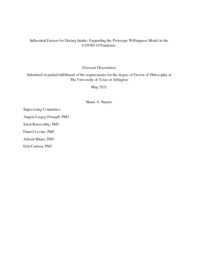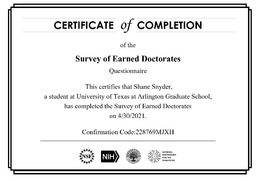| dc.description.abstract | Only 10-13% of individuals consume enough fruit and vegetables. Not only do fruit and vegetables help stave off chronic disease, but they also help maintain weight, and contain nutrients that reduce inflammation, infection, and cancer incidence by enhancing the immune system. The COVID-19 pandemic has also put a strain on individuals, disheveling dietary routines, promoting sedentary behavior, and provoking increased stress. This research tested the prototype willingness model to examine factors that could influence fruit and vegetable intake while considering the influence of COVID-19 and more stable personal descriptors (i.e., perceived threat and fear from not consuming enough fruits and vegetables, body mass index, health conditions, social desirability, and demographic factors) in an adult sample. Hierarchical regressions were conducted to analyze these aims with a sample of 259 participants. The sample was primarily White (N = 78; 29.89 %), and female (N = 209; 80.08%), with a mean age of 19 (SD = 2.99). Most participants were not employed (69%) and had a family income mean range of $65,000-74,999. Results showed the prototype willingness model with attitudes, subjective norms, descriptive norms, nutrition knowledge, prototype descriptions, prototype similarity, willingness, and intentions was the most parsimonious. Additionally, willingness to eat healthy in the context of unhealthy eaters contributed most strongly to greater fruit and vegetable intake, and, finally, moderation was observed with COVID-19 trauma, checking stress, and T1 intake. As a takeaway, encouraging healthier eating in contexts when norms suggest otherwise and providing regular stress checkups along the behavior change pathway may be beneficial. In summary, this study elucidated the importance of known prototype willingness model factors and additional factors with potentially less influence for better dietary behaviors. | |



